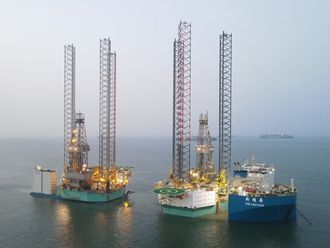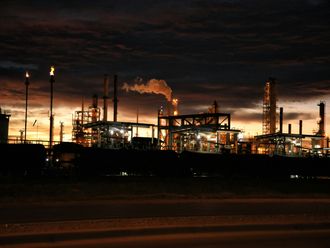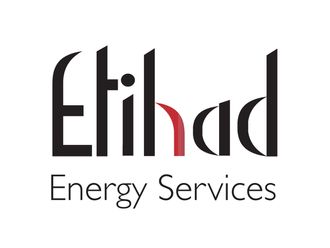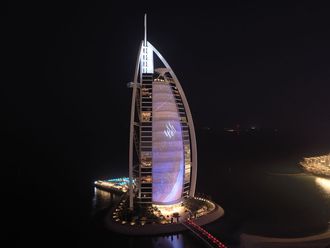Britain's BG Group plans to make its new commercial operations at its Rosetta field near Alexandria the start of a major hub for Egyptian gas, company executives said yesterday. They also said the gas giant also hopes to expand into deep water production and exports of liquefied natural gas (LNG).
"BG is already one of the largest foreign investors in Egypt, and that investment has the potential to grow significantly," Richard Giordano, Chairman of BG Group Plc told reporters ahead of a site visit. "The commercial start-up of Rosetta is only the first step. The second will focus on our further exploitation of the West Delta Deep Marine discoveries - the largest gas finds ever made in the country," he added. "In time, we plan to create a facility to process and export LNG from our significant uncommitted reserves in West Delta Deep."
Giordano described BG's success rate in exploring for gas in Egypt as "extraordinary", with a 100 per cent success rate at its 11 wells in the West Delta Deep Marine concession and a total 13 wells tested in Egypt in 2000 successfully. He said BG has large uncommitted reserves in Egypt amounting to six trillion cubic feet (170 billion cu metres), which is more than enough for a viable LNG project.
"Our aspiration will be to put this in place and continue to develop the fields, the deep area in the West Nile Delta, and the supply markets like Italy, Spain and the United States," he said. "Our current commitment in Egypt with our partners is about $1 billion. If we went ahead with these ambitions...that could grow into $3 billion," he stated. That would make Egypt a major global gas player, he added. The Rosetta field went into commercial production on January 31 and now supplies Egypt's national grid, he said.
It is governed by a 25-year sales agreement with the state-owned Egyptian General Petroleum Corp (EGPC). Production is set to rise to 275 million standard cubic feet (7.787 million cubic metres) of gas per day. Rosetta was developed by the Rashid Petroleum Co (Rashpetco), a joint venture formed by the EGPC (50 per cent), BG (20 per cent), Royal Dutch/Shell (20 per cent) and Italy's Edison International (10 per cent).
Asked about the advantages of producing from Egypt as opposed to other gas-rich countries, Giordano stressed Egypt's location close to well-developed gas markets like Spain and Italy. Gas is the fuel of the future, Giordano said, adding: "Its cleanliness, its abundance, it efficiency are all well-known".
Peter Dranfield, President of BG Egypt, said the firm is in talks with potential buyers. "We are also in the process of finalising certain commercial arrangements here in Egypt so that we can put our energy into a tanker in Egypt for a price which is going to be competitive in the market place," he said. On possible timing of a LNG plant, he said BG has been trying to finalise terms
with Cairo. If an agreement were signed soon, BG could start shipping LNG some time early in 2005. BG said it was now talking to the government about amending the gas price formula. Deep sea gas exploration technology and an LNG plant would both be firsts for Egypt.
BG's Scarab/Saffron field is the first gas field development in deep water off the Nile Delta and the largest gas field development in Egypt. First gas production is expected in January 2003. Meanwhile, foreign firms in Egypt can sell gas to whoever they please, Egyptian Oil Minister Sameh Fahmi said on Monday when quizzed over recent contradictory reports on a possible agreement to sell Egyptian gas to Israel.
"Yes of course they have the right to sell the gas to anybody," he told Reuters when asked if there was a possibility that foreign firms might sell Egyptian gas to Israel. "According to the concessions, this gas is their gas and they can sell it to anybody they want to," he added. But the minister gave no details of the identity of any party that might be in talks with Israel over the sale of Egyptian gas. Asked about a report last month stating that an agreement had already been sealed, Fahmi merely asked where the report had come from and then suggested asking that party about the report. He then boarded a helicopter and left the gas plant.
State-run Israel Electric Corp (IEC) said on January 25 it had chosen a joint Egyptian and Israeli firm to supply more than half of the natural gas it seeks to buy in a contract worth $3 billion over 10 years. IEC said in a statement it would launch detailed negotiations with East Mediterranean Gas (EMG) to sign a deal for purchasing 1.7 billion cubic metres of natural gas, more than half of the amount it seeks to buy.
It said the contract would include an option to increase the amount purchased from Egypt. Israel has discussed energy supply with neighbour Egypt for years but the talks have often been subject to the stops and starts of Middle East peacemaking. EMG is a joint venture of the Egyptian General Petroleum Company and Israel's Merhav Group. Fahmi was quoted on Thursday as saying he was surprised at reports that Egypt would supply Israel with natural gas.
"During the last two weeks, I have been following with great amazement the many reports alleging that Egypt will supply Israel with a $3 billion-deal that is to continue until at least 2012," the English-language Al Ahram Weekly quoted him as saying. Relations between the two countries are chilly despite the peace treaty they signed in 1979. A surge of Israeli-Palestinian violence that has killed more than 400 people, mostly Palestinians, since September has further clouded the
relationship.
IEC, which holds a monopoly on Israeli electricity distribution, has faced strong pressure from the government to choose an Israeli supplier as local companies develop the country's offshore natural gas reserves. Egypt has in the past faced budgetary pressures from having to buy up its own gas supply in the absence of export markets.
Spain agreed this month to import about 30 per cent of its natural gas needs from Egypt at a cost of some $1.7 billion over several years.
BG to make Rosetta field Egyptian gas hub
Britain's BG Group plans to make its new commercial operations at its Rosetta field near Alexandria the start of a major hub for Egyptian gas, company executives said yesterday.












